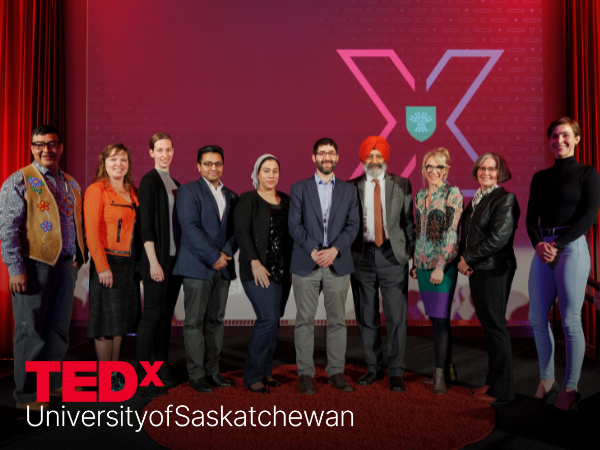2023 Event

Amira Abdelrasoul | Arinjay Banerjee | Lisa Birke
Kylee Drever | Kevin Lewis | Merle Massie
Steven Rayan | Maureen Reed | Linda Vogt
Watch all the talks here
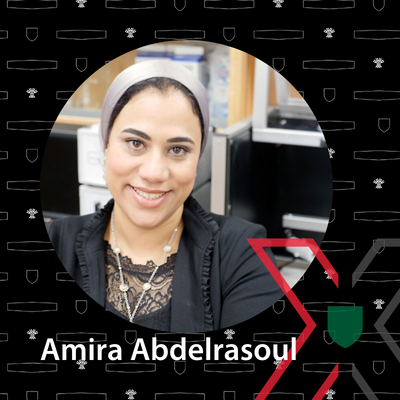
Creating a Wearable Kidney Would Change the Lives of Kidney Failure Patients
Hemodialysis is not a perfect replacement for healthy kidneys and here’s why…
Not all kidney failure patients are able to receive an organ transplant, which means the alternative is to be placed on hemodialysis. Hemodialysis is a life-sustaining treatment for kidney failure patients that cleans and filters their blood of waste products, salts, and excess fluid. However, this membrane-based therapy does not exactly replicate the function of a healthy kidney. Many acute and chronic complications occur from this treatment and my job as a membrane researcher is to create hemodialysis membranes that are more compatible with the human body than the membranes used in hospitals today. My long-term aim is to create a wearable design. Raising awareness about the importance of maintaining kidney function is needed so the critical stages of kidney disease can be avoided.
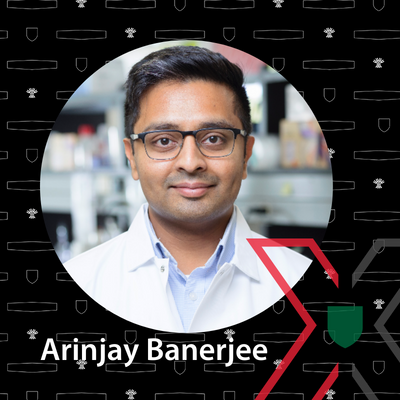
It is in our hands to shape the future of emerging infectious diseases
In this talk, we will reflect upon our childhood. We will try to remember what it felt like to run around and play without having to worry about anything. However, childhood memories vary for everyone, especially if you grew up in a country where infectious diseases are rampant. We will learn about the threat posed by emerging infectious diseases, factors that drive emerging infectious diseases, and the role that we all play in securing a better future and to protect the next generation of humans and animals from life threatening infections. We will go on a journey where we will reflect on choices that humans have MADE, the impact of infectious diseases such as COVID-19 on our lives, and the choices that humans CAN make to make this world a safer place.
Dr. Arinjay Banerjee (PhD) is an award winning virologist and the Principal Investigator of the Laboratory of Zoonotic Viruses and Comparative Immunology at the Vaccine and Infectious Disease Organization, University of Saskatchewan. Dr. Banerjee is the co-lead for One Health at the University of Saskatchewan. Research within Dr. Banerjee’s laboratory focuses on three main themes that are inspired by the One Health ideology, (1) virus-host interactions in wildlife reservoir species, such as bats, (2) virus-host interactions in spillover species, such as humans, and (3) viral vaccine development.
Dr. Banerjee completed his Master of Science degree in virology from the National Institute of Virology in India where his Master’s thesis was awarded the university gold medal. Next, Dr. Banerjee completed his PhD from the University of Saskatchewan where his doctoral thesis on coronavirus-host interactions was awarded Canada’s Governor General’s Gold medal. Dr. Banerjee’s postdoctoral research at McMaster University was awarded the Gerard Wright postdoctoral award in Infection Research and the postdoctoral fellow impact award. More recently, Dr. Banerjee was selected as 2022 CBC Saskatchewan’s Future 40.
Dr. Banerjee is passionate about One Health, which is a concept that embraces the interconnectedness of human, animal, and environment health. The future of our planet and the health of our ecosystems are truly dependent on the actions of humankind. Dr. Banerjee’s TEDx talk will focus on what will it take to protect a planet in crisis.
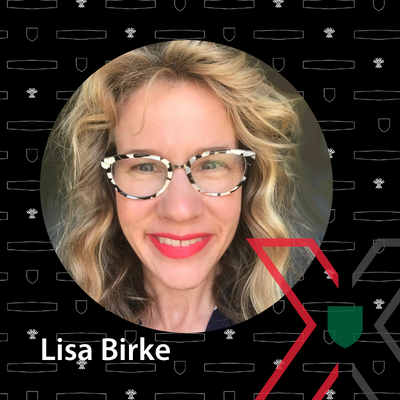
Strive for failure as a joyful and productive catalyst in the creative process
Mastering the tango in the expectation ring: video artist and University educator, Lisa Birke, uses her experience of teaching art to children and a particular “hiding painting” to inspire dancing with failure as a joyful and productive catalyst in the creative process.
My life has been a comedy of errors that has brought me to my current position as assistant professor and area chair of Digital and Integrated Practice in the Department of Art & Art History here at the University of Saskatchewan as a self-confessed (and only recently converted) luddite. I have been a passionate educator for over 20 years and hope to inspire the dive into the unknown through a trusting of the process, elbow grease, and a big dose of humour.
My active art practice is a result of the collision of video, performance art, and installation. I am interested in the stories that we re-cite and re-brand and how these inform our conception of the world and the tragi-comic perception of ourselves in the mixing of referents from art history, popular culture and the everyday. Recently, I have been exploring immersive multi-media approaches using special effects, augmented reality, and 360 video. My video work has seen more than 100 screenings and installations at film festivals, media centers and in galleries and museums internationally, including Vancouver International Film Festival, Slamdance Film Festival, Florida Film Festival, and the Remai Modern, along with many others.
Some years ago, I might have been considered “cool” as I was active in the street dance and b-girl scene. Now my students sometimes call me “ma’am” and I wonder where I went wrong—although I attempt to uphold a semblance of youthful enthusiasm and fearlessness which I hope will be reflected in my talk.
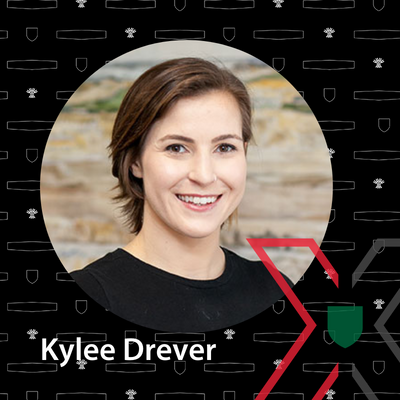
Tuberculosis is not gone and should not be forgotten
Tuberculosis (TB) is an ancient plague that has affected humankind for close to 70,000 years. I want to remind our community of the forgotten plague, explain why we should care about it and other forgotten but not gone diseases, and hopefully ignite the curiosity and care for research in individuals who may not realize that they can make a huge difference for those around the world who do not have the means to do so themselves.
Kylee Drever grew up in Regina, SK, where her endless questions (probably) annoyed her schoolteachers and definitely annoyed her classmates. In fact, her life motto is “curiosity killed the cat, but satisfaction brought her back”. This curiosity eventually led her to the University of Manitoba where she graduated with a BSc in Microbiology, and then to the University of Saskatchewan, where she recently completed her PhD in Veterinary Microbiology at the WCVM. She conducted research at VIDO, focusing on Mycobacterium tuberculosis, the bacterium responsible for tuberculosis, one of the worlds leading causes of death. Beyond her research, Kylee spends most of her time on the mats practicing Brazilian jiu-jitsu, walking her Rottweiler-Bullmastiff Hercules, and caring for her small jungle of ever-dying plants.
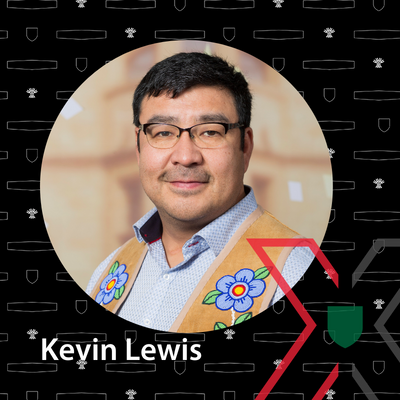
Revitalizing Places: Land Based Cree Immersion and the kâniyâsihk Culture Camp
There is a little camp in Northwestern Saskatchewan, on a First Nation, that has been doing amazing research in Indigenous arts, music, architecture, song, linguistics and language. This place has grown to be a hotspot of revitalization and it is traditionally known as kâniyâsihk and now known as kâniyâsihk Culture Camps (kCC), a non-profit organization, which is on Treaty 6 Territory and has hosted institutes of higher learning such as the University of Saskatchewan. It is a safe place for our language and culture to share with the world the beauty of our people, the Cree.
Kevin Lewis, Assistant Professor, Curriculum Studies, College of Education, developed a certificate program in Indigenous Languages for teachers from across the province to immerse themselves in the Cree language and cultural practices. He believes learning Cree restores people, not just the language, giving Indigenous people confidence and an understanding that their people had sophisticated societies and technologies before settlers came. In his home community of Ministikwan Lake Cree Nation, Dr. Lewis has served in roles as teacher, vice principal and band councillor. Dr. Lewis has been working with community schools in promoting land and language-based education and is founder of kâniyâsihk Culture Camps a non-profit organization focused on holistic community well-being and co-developer of Land-Based Cree Immersion School kâ-nêyâsihk mîkiwâhpa.
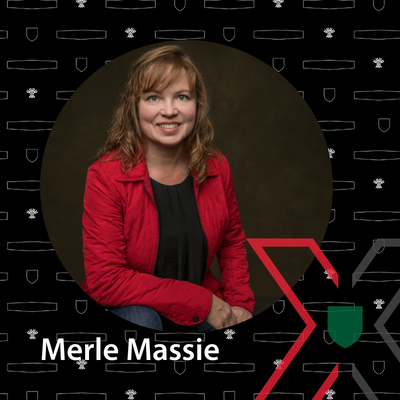
Who Can Be A Researcher?
Research will engage more people when more people see themselves as researchers
In its original meaning, Research was a verb that meant ‘Go Seek.’ If we reclaim this original understanding, research will be understood as an action in which anyone can engage. Reclaiming this definition will counteract the sense of elitism and exclusion associated with the word ‘research’, and more people will understand themselves to be welcome as researchers: unique individuals with their own knowledge and practices who, no matter if they are just starting or senior researchers, are valued on this journey to Go Seek. With this reclaimed definition, we will grow the culture and number of practitioners of research.
Merle Massie is an award-winning author and historian, specializing in western Canadian local, rural, environmental, and medical history. She and her husband farm in west-central Saskatchewan, on land that sits on the edge between Blackfoot and Cree traditional territory. Massie works at the University of Saskatchewan as the Coordinator, Undergraduate Research Initiatives in the Office of the Vice-President Research and is a Professional Research Associate with the School of Environment and Sustainability at USask. In her spare time, Massie is an avid reader, camper, skier, paddler, baker, gardener, and thrower-of-things-for-puppies-to-fetch.
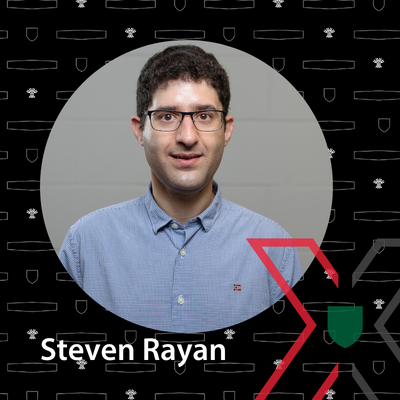
Quantum Magic: Using Mathematics and Art to Make the Impossible Possible
You've heard that quantum technologies will change our lives — I'm here to tell you that they already have.
Quantum technology may sound like the stuff of science fiction. But it is already around us, everywhere. It has illuminated the world, shrunk distances, and saved lives. I will demonstrate this with a few concrete examples in my talk. We can also ask where this technology is heading in the years to come. In order to access the next level of quantum technology, we need creative leaps that not only anticipate the future of science and mathematics but which also take inspiration from other disciplines, where bold steps have already been taken to imagine the impossible. I will plant a few hopeful seeds for such leaps by drawing upon some very recent research.
Born and raised in northern Ontario, Steven Rayan (he/him) is a mathematician —more specifically, a geometer. His world consists of numbers and shapes, and he uses them to gain insight into the universe around us. Most recently, he has been using geometry to discover new features of quantum science, including quantum materials, and his work has been highlighted in venues such as Scientific American. At USask, Steven serves in a few different roles: professor in the Department of Mathematics and Statistics, lead for the new Signature Area of Research in Quantum Innovation, director of the Centre for Quantum Topology and Its Applications (quanTA), director of Interdisciplinary Programming in the College of Graduate and Postdoctoral Studies, and chair of the Mathematical Physics program. He enjoys these roles and finds tremendous synergy between them. Before arriving at USask in 2016, he earned his doctoral degree at the Mathematical Institute of the University of Oxford and then spent a number of years as a postdoctoral fellow at the University of Toronto. Steven strives to support interdisciplinary, high-risk, high-reward research, and these efforts include serving as a co-chair of the multidisciplinary review committee for the Tri-Agency's New Frontiers in Research Fund (Exploration Stream) in recent years. Saskatchewan has been an especially inspiring place for Steven to develop his research. With its tall grasses, pristine lakes, and glimmering sky, this is the right place to think big!
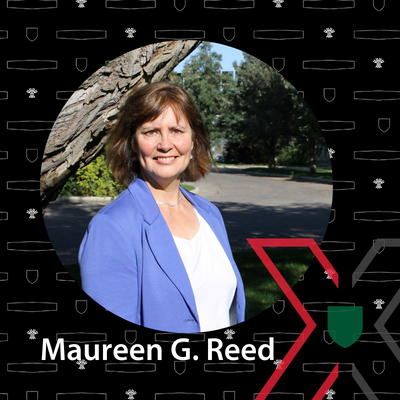
It’s time to change what and how we teach at universities to empower graduates to sustain people and the planet
Maureen Reed explains that academic programs in sustainability are not providing university graduates with the skills they need to secure a sustainable and equitable future. For student and senior researchers to become sustainability change makers, university educators need to spend less time on teaching the science of environmental change and more time on the art of making change. She explains that global sustainability challenges are profoundly social. Environmental science alone cannot address them. Researchers must learn and teach how to collaborate more effectively and rebuild relationships with people and with nature; academic programs in sustainability must graduate citizens who will become co-learners, reflective practitioners, and advocates for change.
Dr. Maureen Reed is Distinguished Professor and UNESCO Chair in Biocultural diversity, sustainability, reconciliation and renewal at the School of Environment and Sustainability, University of Saskatchewan. Her research program focuses on the social dimensions of sustainability – how people, processes and institutions – shape decisions about environment and development. She focuses on rural places, including Biosphere Reserves/Regions, learning how governance processes can support community resilience and well-being. She and her students have tackled gender and diversity issues in Canada’s forest sector, seeking to understand how climate hazards affects diverse rural peoples and to build inclusive processes for adapting to climate change.
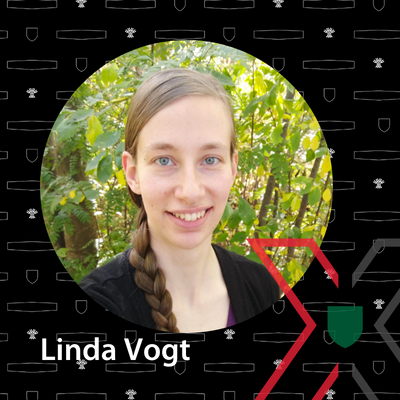
Light is as versatile as the researchers who wield it
Light is a vital part of our everyday lives, allowing us to find our belongings, listen to music, heat our food, and navigate our world. Light is also just as useful to researchers as an incredibly versatile tool to examine things both large and small – such as at a synchrotron light source. By learning from disciplines other than their own, researchers can increase their own versatility and get a better sense of the tools that others use to answer research questions, communicate and collaborate as part of a multidisciplinary research community to solve large and complex problems, and take full advantage of the versatility of synchrotron light to do so.
Linda Vogt is a PhD student in the Department of Geological Sciences at the University of Saskatchewan. She received a BSc in Chemistry in 2017 and a BSc in Geology in 2019 from USask. Her current research involves using a synchrotron technique called X-ray absorption spectroscopy to study some of the elements known to contribute to the corrosivity of crude oils in refinery conditions. She is an active member of the local and regional synchrotron community; as a Fellow of the NSERC-CREATE to INSPIRE synchrotron training program hosted at USask, a user at multiple beamlines at the Canadian Light Source and other synchrotron facilities in the States, and prior to the pandemic as a casual employee at the CLS in both Outreach and HSE. Linda is passionate about science education and outreach and aims to promote synchrotron facilities, such as the Canadian Light Source, as accessible hubs of innovation and collaboration where cutting-edge inter- and multi-disciplinary research can take place.
Stay in the know
Subscribe to Discovery Digest for updates about TEDxUniversityofSaskatchewan.
